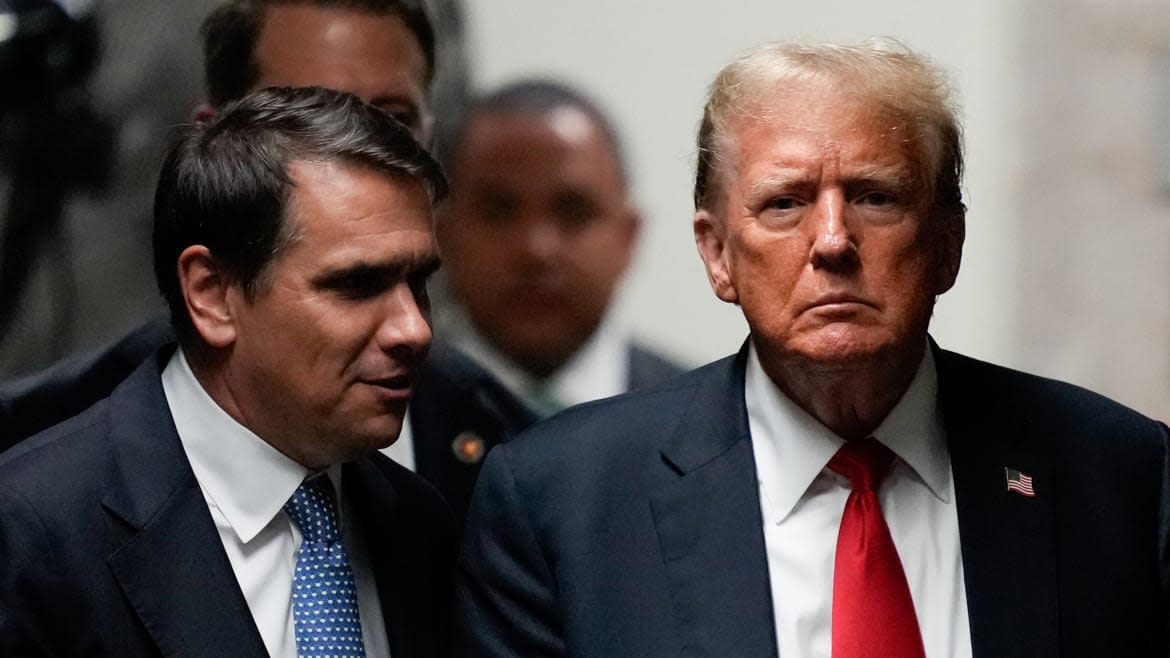Opinion: Trump’s Defense Was About as Strong as Childhood Name-Calling

There is little doubt as to which side in the Trump hush-money trial did a better job in closing arguments. Todd Blanche barely stopped short of chanting the schoolyard taunt “Liar, Liar, Pants on Fire” in his closing summation. This was a surprising move by former President Trump’s lead defense counsel, who by some accounts invoked “lie” about 60 times in his rambling two-hour long argument. But a mantra of name-calling does not make for a coherent defense strategy.
Towards the end of his summation, Blanche did give the jury a David Letterman-style “Top Ten” list of reasonable doubts, which he prefaced by saying he would go through it before he sat down. Apparently, Blanche is unfamiliar with the journalism term “burying the lead.” Taken individually, there was nothing wrong with Blanche’s substantive attacks on the prosecution’s case. Among the better—albeit poorly developed—points was the argument that it was Michael Cohen who created the fake invoices, not Trump. Blanche would have been better off to have started with a roadmap of his attack and then methodically guided the jury to areas where reasonable doubt might be found about the strength of the government’s evidence. Such an approach would have been well-suited to Blanche’s primary experience as a prosecutor given that prosecutors must build cases.
But a common rookie misunderstanding of criminal defense is that the defense does not need to build a case but can just take pot shots at the prosecution. While this is legally true, because the defense doesn’t have to prove anything at all, the reality for criminal defense counsel is much different. As a former prosecutor who won my first criminal defense case, I believe that it is critical to build a defense case just as prosecutors build their cases. Jurors cannot viscerally grasp the concept that the defendant has no burden of proof and that it is enough to just cloak the defendant in the presumption of innocence. Acquittals have to be earned through evidence. For the defense, that evidence can be either through witnesses they present or the testimony they elicit on cross examination. Trump’s team crashed and burned with the substantive witness they did present— attorney Bob Costello—who was nearly held in contempt by Judge Merchan for his arrogant and insulting behavior toward the judge. Their cross-exams were mostly unfruitful as well.
This dearth of evidence may have caused Blanche to make another common beginner’s mistake in defense work, which is to try and win with emotion rather than facts. Some roots for this common error may come from movie portrayals of defense lawyers making passionate “To Kill a Mockingbird” style speeches to juries to win them over. Blanche fell into this school of emotional criminal defense. He primarily focused on venting his outrage over Michael Cohen. He yelled at the jury,”It was a lie” (referencing Cohen’s testimony), dramatically prolonged his pronunciation of the word perjury as “per-jur-y,” and eventually drew an objection from the prosecution after he accused them of being “perfectly happy” to be part of Cohen lying to the jury. The objection was sustained.
Trump Lawyer Closes Trial by Scorching Michael Cohen
Blanche then called Cohen “literally like the M.V.P. of liars” and coined a very “Dad-style” term: “the G.L.O.A.T” for Cohen – Greatest Liar of All Time. Such sports metaphors perhaps resonated with Trump, but likely fell flat with jurors who are not inclined to treat their jury experience as a sports metaphor.
In sharp contrast to Blanche, lead prosecutor Joshua Steinglass led the jury through a detailed summary of the evidence produced by the weeks-long trial. He took about twice the time Blanche did, ending up with a closing of around four hours long. Those who would criticize the length of Steinglass’s closing would do well to show a case where the prosecution lost because they gave the jury too much detail in closing. Phrases like “you can lose the jury” are cliches that fail to take into account the reality of trial work. You don’t lose juries by giving them too much evidence. You lose them by not giving them enough. Judge Merchan’s decision to let the jury sit all the way until 8 p.m. so that closings would be finished in one day can be criticized as being needlessly exhausting to jurors, lawyers and courtroom observers. Exhaustion, however, is not grounds for appeal in the event of a criminal conviction. The marathon session allowed the jury to be fresh for the commencement of jury instructions the next morning and allowed for nearly three full days of deliberation before the end of the week.
Analysis of evidence and lawyer performances do not always predict a jury verdict, but they are sound foundations upon which to venture predictions. The Manhattan D.A.’s lawyers had a heavier burden than usual to meet given the unprecedented nature of trying a former President of the United States. They appear to me to have met that burden.
Trump’s defense team likely made a mistake by relying on the idea that the jury would adopt the idea of “Liar, Liar, Pants on Fire” and reject all of Cohen’s testimony. The origins of that schoolyard taunt supposedly come from a William Blake poem, “The Liar,” which includes the verses “Deceiver, dissembler your trousers are alight.” That origin, however, is a false one, as the poem is considered to have been a fake, not written by Blake at all. The Trump defense team’s strategy also seems like an imposter defense, not really mounted for the jury but for the whims of the client: Donald J. Trump.
Get the Daily Beast's biggest scoops and scandals delivered right to your inbox. Sign up now.
Stay informed and gain unlimited access to the Daily Beast's unmatched reporting. Subscribe now.


